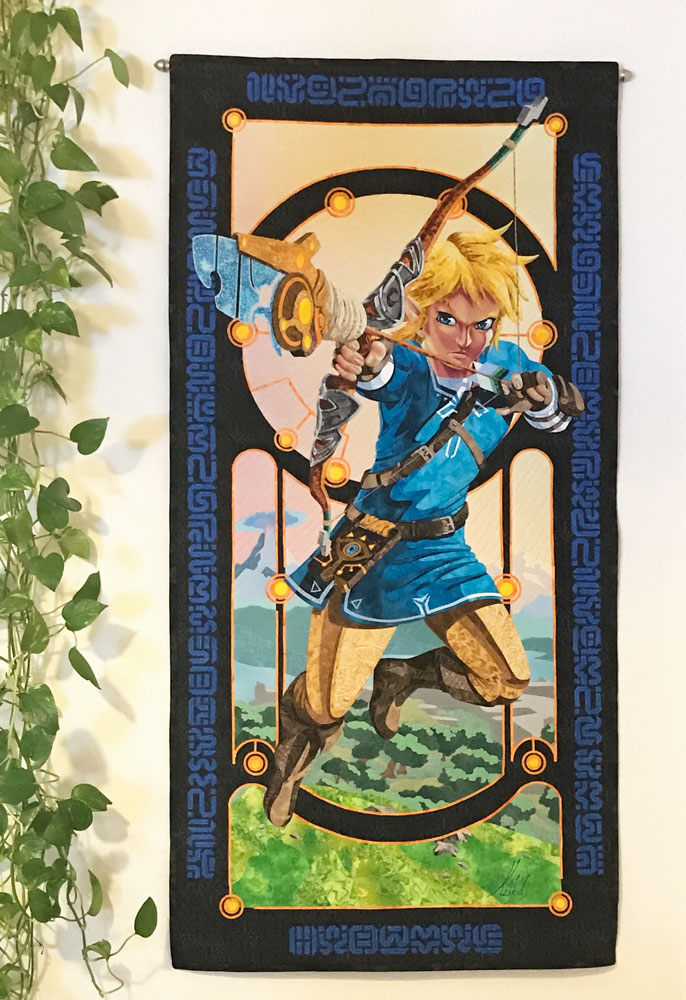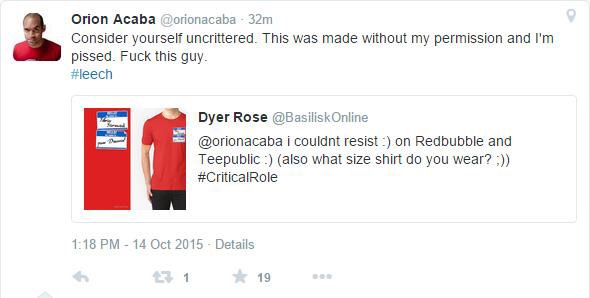Fan Art and Copyright Law
- Published:
- Length: 1585 words
- Reading Time: 8 minutes
I’ve been asked about copyright by a number of quilters as it relates to my newest quilt, so I decided to make this blog post about it. Let me preface this post by saying I am not a lawyer, so everything I'm about to say is based on my own opinions developed from the research I've done on my own time. If you have any questions about copyright law, I would encourage you to talk to a lawyer.
Back to my quilt. Here is a photo of the quilt that has sparked the discussion:
Of all the artwork I've made so far in my life, this is one of only two quilts that have sparked discussions about copyright. The reason for that is because the subject, Link, is from the video game The Legend of Zelda: Breath of the Wild and he is property of Nintendo of America, Inc. How did I avoid copyright infringement when using him in my quilt?
Strictly speaking, I didn't. There’s no “getting around” the copyright issue. Copyright law is written very much in favor of the creator/copyright holder. As far as the law is concerned, my making this quilt is against the law because I don’t own Link, Legend of Zelda, nor Breath of the Wild. When it comes right down to it, I am using Nintendo’s intellectual property without permission. Except....my quilt would be considered fan art, and that makes it a bit different.
Fan art is a double-edged sword for owners of popular characters. It’s bad because every instance of fan art is a copyright infringement. It’s good because allowing fan art keeps the fan base happy and fan art can be free promotion for the game, movie, TV show, etc. Happy, enthusiastic fans spend money on games and merchandise. Happy, enthusiastic fans ALSO make fan art. Prosecuting everyone who creates a piece of fan art (even by just issuing Cease & Desist notices) would dramatically upset the fan base, would cost an arm and a leg in lawyer fees, and would severely limit future profits (since upset fans won’t buy future games, merchandise, etc.)
Have companies or organizations ever backed down in the face of fan outrage? The answer is unequivocally: Yes. Here are two examples.
Example 1: Orion and Critical Role
Critical Role is a show "where a bunch of nerdy-ass voice actors sit around and play Dungeons & Dragons." (That's the show's actual tagline). Each player has a character that he or she created for the show, and everything about that character (name, appearance, traits, mannerisms, etc.) is the sole intellectual property of the respective player.
In late 2015, one of the players on the show, Orion, got very upset at a Critical Role fan who had used Orion's character's name on a t-shirt and then listed it for sale. This was the exchange that took place over Twitter:

This was not the first instance of Orion upsetting Critical Role's fan base, but it definitely was the last straw. The fallout from this incident was Travis Wellington, another player on the show, apologizing to the fan via Twitter and Orion being removed from Critical Role.
Example 2: Nintendo and EVO
On July 9, 2013, Nintendo informed EVO that the tournament would not be permitted to live-stream Nintendo's fighting game, Super Smash Bros. Melee. EVO is the world's largest fighting game tournament, where thousands of fans watch players compete in a number of different fighting games, both in person and online. Super Smash Bros. Melee is one of the most popular fighting games of all time, so Nintendo telling EVO it couldn't broadcast the event was a bit like the NFL telling ESPN it couldn't broadcast the Rose Bowl (even though, legally, Nintendo was completely within its rights to do so. Publicly broadcasting a video game is no different than publicly showing any movie when it comes to copyright infringement.)
Fan outcry and public backlash was enormous, and Nintendo completely reversed its proclamation within three hours of the initial announcement.
When does fan art "cross the line"?
Companies typically start to care about fan art when either the fan art is offensive, misrepresents the brand in some way, when the creators of said fan art start making lots of money, or when creators of said fan art start costing the original company lots of money. Here are two more examples:
Blizzard shuts down a fan-made Playboy parody of its Overwatch video game.
JK Rowling wins a lawsuit against Harry Potter Lexicon, preventing the creator of the fan-made site from releasing a for-profit book based on the Harry Potter universe. This one is particularly interesting, because the Harry Potter Lexicon had been well-tolerated by Rowling for many years. The problem only arose once the website creator wanted to start profiting from Rowling's intellectual property.
In the case of my Link quilt, Nintendo (the company that owns all Legend of Zelda copyrights) would very much care if I started to sell thousands of prints once it’s finished, or if I were to start mass-producing them and handing them out for free. Neither is my intention.
Is fan art ever legal?
That's a tricky question without a clear-cut, universal answer. Using anyone else's intellectual property without permission is, on the surface, against the law, but there are certain factors that can muddy the waters and potentially give fan artists a strong defense. For example, the fact that I’m making a quilt, and not a drawing, movie, print, or other type of fan art, works in my favor. Changing medium is important. What I mean is, Link and the Legend of Zelda game series were originally video games. The characters from the game series have also been printed as digital art and show up in video cutscenes. Nintendo has never licensed Link as a quilt. The fact that I am using my own design and creating something that Nintendo has never licensed, even though my creation is based off Nintendo’s intellectual property, would all work in my favor.
Another example is the cosplay competition at Blizzcon. Blizzcon is a convention hosted by Blizzard, Inc. every year. Blizzard invites its convention attendees to dress up like characters from Blizzard's games, and holds a contest to see who has the best outfit. Technically, everyone who participates in cosplay is breaking copyright law, because none of them own the rights to the characters they're portraying. However, by holding a sponsored competition, Blizzard is actively inviting anyone to use its intellectual property as inspiration for an outfit.
What does this mean for me and my quilt?
I think it’s fair to say I’m taking a calculated risk by creating this quilt, and the other video game-themed quilts I’ve made in the past. I’m betting that by not profiting too much from my game-inspired quilts, I will stay beneath the notice of the companies that own the intellectual property I’m using for inspiration. So far, that has been completely true. People like me, who make fan art primarily for personal enjoyment, are not the lowest-hanging fruit on the tree.
A word of warning: There is one notable company that has a zero-tolerance policy when it comes to fan art, and that company is Disney. (Side note: The movie Frozen has caused Disney to begin to relax its policy.)
I can’t see myself ever making a fan art quilt of a Disney character, even without intent to sell, because I don’t feel it’s worth the risk. However, even Disney doesn’t send out Cease & Desist notices to parents of kids who dress up like Tinkerbell on Halloween, even if the outfit is handmade. (Disney very well would go after a company manufacturing unlicensed Tinkerbell costumes, though.)
Video Resources
This video was very helpful to me in better understanding fan art and copyright. It's a recording of a speech given at Comicon by a lawyer who has worked on "both sides" of copyright law, per se. Quality isn't great, but I hope you find it informative.
This second video was created by a professor at Bucknell University with the intent of creating a humorous yet informative movie to review copyright principles, all while poking fun at Disney by using animated footage to deliver the words of wisdom.
Final Thoughts
Lastly, I want to state for the record that while I support the creation of fan art, I do not condone generally using other people’s work without permission . As a creator and owner of intellectual property myself, I don’t want other people to steal my work for their own purposes. I would not just go grab a photo and recreate it exactly in any of my work, unless I had permission to do so. But, like I said before, fan art is a little different.
